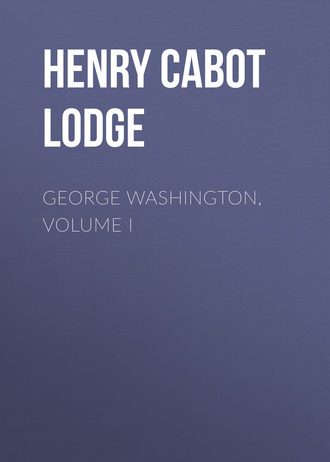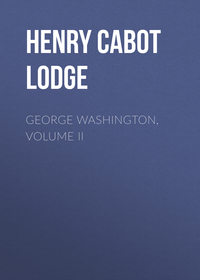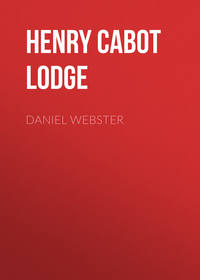 полная версия
полная версияGeorge Washington, Volume I
But there was one man who did not hesitate nor give up, nor halt on account of floating ice. With twenty-four hundred hardy veterans, Washington crossed the Delaware. The night was bitter cold and the passage difficult. When they landed, and began their march of nine miles to Trenton, a fierce storm of sleet drove in their faces. Sullivan; marching by the river, sent word that the arms of his men were wet. "Then tell your general," said Washington, "to use the bayonet, for the town must be taken." In broad daylight they came to the town. Washington, at the front and on the right of the line, swept down the Pennington road, and as he drove in the pickets he heard the shouts of Sullivan's men, as, with Stark leading the van, they charged in from the river. A company of yägers and the light dragoons slipped away, there was a little confused fighting in the streets, Colonel Rahl fell, mortally wounded, his Hessians threw down their arms, and all was over. The battle had been fought and won, and the Revolution was saved.
Taking his thousand prisoners with him, Washington recrossed the Delaware to his old position. Had all done their duty, as he had planned, the British hold on New Jersey would have been shattered. As it was, it was only loosened. Congress, aroused at last, had invested Washington with almost dictatorial powers; but the time for action was short. The army was again melting away, and only by urgent appeals were some veterans retained, and enough new men gathered to make a force of five thousand men. With this army Washington prepared to finish what he had begun.
Trenton struck alarm and dismay into the British, and Cornwallis, with seven thousand of the best troops, started from New York to redeem what had been lost. Leaving three regiments at Princeton, he pushed hotly after Washington, who fell back behind the Assunpink River, skirmishing heavily and successfully. When Cornwallis reached the river he found the American army drawn up on the other side awaiting him. An attack on the bridge was repulsed, and the prospect looked uninviting. Some officers urged an immediate assault; but night was falling, and Cornwallis, sure of the game, decided to wait till the morrow. He, too, forgot that he was facing an enemy who never overlooked a mistake, and never waited an hour. With quick decision Washington left his camp-fires burning on the river bank, and taking roundabout roads, which he had already reconnoitred, marched on to Princeton. By sunrise he was in the outskirts of the town. Mercer, detached with some three hundred men, fell in with Mawhood's regiment, and a sharp action ensued. Mercer was mortally wounded, and his men gave way just as the main army came upon the field. The British charged, and as the raw Pennsylvanian troops in the van wavered, Washington rode to the front, and reining his horse within thirty yards of the British, ordered his men to advance. The volleys of musketry left him unscathed, the men stood firm, the other divisions came rapidly into action, and the enemy gave way in all directions. The two other British regiments were driven through the town and routed. Had there been cavalry they would have been entirely cut off. As it was, they were completely broken, and in this short but bloody action they lost five hundred men in killed, wounded, and prisoners. It was too late to strike the magazines at Brunswick, as Washington had intended, and so he withdrew once more with his army to the high lands to rest and recruit.
His work was done, however. The country, which had been supine, and even hostile, rose now, and the British were attacked, surprised, and cut off in all directions, until at last they were shut up in the immediate vicinity of New York. The tide had been turned, and Washington had won the precious breathing-time which was all he required.
Frederick the Great is reported to have said that this was the most brilliant campaign of the century. It certainly showed all the characteristics of the highest strategy and most consummate generalship. With a force numerically insignificant as compared with that opposed to him, Washington won two decisive victories, striking the enemy suddenly with superior numbers at each point of attack. The Trenton campaign has all the quality of some of the last battles fought by Napoleon in France before his retirement to Elba. Moreover, these battles show not only generalship of the first order, but great statesmanship. They display that prescient knowledge which recognizes the supreme moment when all must be risked to save the state. By Trenton and Princeton Washington inflicted deadly blows upon the enemy, but he did far more by reviving the patriotic spirit of the country fainting under the bitter experience of defeat, and by sending fresh life and hope and courage throughout the whole people.
It was the decisive moment of the war. Sooner or later the American colonies were sure to part from the mother-country, either peaceably or violently. But there was nothing inevitable in the Revolution of 1776, nor was its end at all certain. It was in the last extremities when the British overran New Jersey, and if it had not been for Washington that particular revolution would have most surely failed. Its fate lay in the hands of the general and his army; and to the strong brain growing ever keener and quicker as the pressure became more intense, to the iron will gathering a more relentless force as defeat thickened, to the high, unbending character, and to the passionate and fighting temper of Washington, we owe the brilliant campaign which in the darkest hour turned the tide and saved the cause of the Revolution.
CHAPTER VII
"MALICE DOMESTIC, AND FOREIGN LEVY"
After the "two lucky strokes at Trenton and Princeton," as he himself called them, Washington took up a strong position at Morristown and waited. His plan was to hold the enemy in check, and to delay all operations until spring. It is easy enough now to state his purpose, and it looks very simple, but it was a grim task to carry it out through the bleak winter days of 1777. The Jerseys farmers, spurred by the sufferings inflicted upon them by the British troops, had turned out at last in deference to Washington's appeals, after the victories of Trenton and Princeton, had harassed and cut off outlying parties, and had thus straitened the movements of the enemy. But the main army of the colonies, on which all depended, was in a pitiable state. It shifted its character almost from day to day. The curse of short enlistments, so denounced by Washington, made itself felt now with frightful effect. With the new year most of the continental troops departed, while others to replace them came in very slowly, and recruiting dragged most wearisomely. Washington was thus obliged, with temporary reinforcements of raw militia, to keep up appearances; and no commander ever struggled with a more trying task. At times it looked as if the whole army would actually disappear, and more than once Washington expected that the week's or the month's end would find him with not more than five hundred men. At the beginning of March he had about four thousand men, a few weeks later only three thousand raw troops, ill-fed, ill-clad, ill-shod, ill-armed, and almost unpaid. Over against him was Howe, with eleven thousand men in the field, and still more in the city of New York, well disciplined and equipped, well-armed, well-fed, and furnished with every needful supply. The contrast is absolutely grotesque, and yet the force of one man's genius and will was such that this excellent British army was hemmed in and kept in harmless quiet by their ragged opponents.
Washington's plan, from the first, was to keep the field at all hazards, and literally at all hazards did he do so. Right and left his letters went, day after day, calling with pathetic but dignified earnestness for men and supplies. In one of these epistles, to Governor Cooke of Rhode Island, written in January, to remonstrate against raising troops for the State only, he set forth his intentions in a few words. "You must be sensible," he said, "that the season is fast approaching when a new campaign will open; nay, the former is not yet closed; nor do I intend it shall be, unless the enemy quits the Jerseys." To keep fighting all the time, and never let the fire of active resistance flicker or die out, was Washington's theory of the way to maintain his own side and beat the enemy. If he could not fight big battles, he would fight small ones; if he could not fight little battles, he would raid and skirmish and surprise; but fighting of some sort he would have, while the enemy attempted to spread over a State and hold possession of it. We can see the obstacles now, but we can only wonder how they were sufficiently overcome to allow anything to be done.
Moreover, besides the purely physical difficulties in the lack of men, money, and supplies, there were others of a political and personal kind, which were even more wearing and trying, but which, nevertheless, had to be dealt with also, in some fashion. In order to sustain the courage of the people Washington was obliged to give out, and to allow it to be supposed, that he had more men than was really the case, and so Congress and various wise and well-meaning persons grumbled because he did not do more and fight more battles. He never deceived Congress, but they either could not or would not understand the actual situation. In March he wrote to Robert Morris: "Nor is it in my power to make Congress fully sensible of the real situation of our affairs, and that it is with difficulty, if I may use the expression, that I can by every means in my power keep the life and soul of this army together. In a word, when they are at a distance, they think it is but to say, Presto, begone, and everything is done. They seem not to have any conception of the difficulty and perplexity attending those who are to execute." It was so easy to see what they would like to have done, and so simple to pass a resolve to that effect, that Congress never could appreciate the reality of the difficulty and the danger until the hand of the enemy was almost at their throats. They were not even content with delay and neglect, but interfered actively at times, as in the matter of the exchange of prisoners, where they made unending trouble for Washington, and showed themselves unable to learn or to keep their hands off after any amount of instruction.
In January Washington issued a proclamation requiring those inhabitants who had subscribed to Howe's declaration to come in within thirty days and take the oath of allegiance to the United States. If they failed to do so they were to be treated as enemies. The measure was an eminently proper one, and the proclamation was couched in the most moderate language. It was impossible to permit a large class of persons to exist on the theory that they were peaceful American citizens and also subjects of King George. The results of such conduct were in every way perilous and intolerable, and Washington was determined that he would divide the sheep from the goats, and know whom he was defending and whom attacking. Yet for this wise and necessary action he was called in question in Congress and accused of violating civil rights and the resolves of Congress itself. Nothing was actually done about it, but such an incident shows from a single point the infinite tact and resolution required in waging war under a government whose members were unable to comprehend what was meant, and who could not see that until they had beaten England it was hardly worth while to worry about civil rights, which in case of defeat would speedily cease to exist altogether.
Another fertile source of trouble arose from questions of rank. Members of Congress, in making promotions and appointments, were more apt to consider local claims than military merit, and they also allowed their own personal prejudices to affect their action in this respect far too much. Thence arose endless heart-burnings and jealousies, followed by resignations and the loss of valuable officers. Congress, having made the appointments, would go cheerfully about its business, while the swarm of grievances thus let loose would come buzzing about the devoted head of the commander-in-chief. He could not adjourn, but was compelled to quiet rivalries, allay irritated feelings, and ride the storm as best he might. It was all done, however, in one way or another: by personal appeals, and by letters full of dignity, patriotism, and patience, which are very impressive and full of meaning for students of character, even in this day and generation.
Then again, not content with snarling up our native appointments, Congress complicated matters still more dangerously by its treatment of foreigners. The members of Congress were colonists, and the fact that they had shaken off the yoke of the mother country did not in the least alter their colonial and perfectly natural habit of regarding with enormous respect Englishmen and Frenchmen, and indeed anybody who had had the good fortune to be born in Europe. The result was that they distributed commissions and gave inordinate rank to the many volunteers who came over the ocean, actuated by various motives, but all filled with a profound sense of their own merits. It is only fair to Congress to say that the American agents abroad were even more to blame in this respect. Silas Deane especially scattered promises of commissions with a lavish hand, and Congress refused to fulfill many of the promises thus made in its name. Nevertheless, Congress was far too lax, and followed too closely the example of its agents. Some of these foreigners were disinterested men and excellent soldiers, who proved of great value to the American cause. Many others were mere military adventurers, capable of being turned to good account, perhaps, but by no means entitled to what they claimed and in most instances received.
The ill-considered action of Congress and of our agents abroad in this respect was a source of constantly recurring troubles of a very serious nature. Native officers, who had borne the burden and heat of the day, justly resented being superseded by some stranger, unable to speak the language, who had landed in the States but a few days before. As a result, resignations were threatened which, if carried out, would affect the character of the army very deeply. Then again, the foreigners themselves, inflated by the eagerness of our agents and by their reception at the hands of Congress, would find on joining the army that they could get no commands, chiefly because there were none to give. They would then become dissatisfied with their rank and employment, and bitter complaints and recriminations would ensue. All these difficulties, of course, fell most heavily upon the commander-in-chief, who was heartily disgusted with the whole business. Washington believed from the beginning, and said over and over again in various and ever stronger terms, that this was an American war and must be fought by Americans. In no other way, and by no other persons, did he consider that it could be carried to any success worth having. He saw of course the importance of a French alliance, and deeply desired it, for it was a leading element in the solution of the political and military situation; but alliance with a foreign power was one thing, and sporadic military volunteers were another. Washington had no narrow prejudices against foreigners, for he was a man of broad and liberal mind, and no one was more universally beloved and respected by the foreign officers than he; but he was intensely American in his feelings, and he would not admit for an instant that the American war for independence could be righteously fought or honestly won by others than Americans. He was well aware that foreign volunteers had a value and use of which he largely and gratefully availed himself; but he was exasperated and alarmed by the indiscriminate and lavish way in which Congress and our agents abroad gave rank and office to them. "Hungry adventurers," he called them in one letter, when driven beyond endurance by the endless annoyances thus forced upon him; and so he pushed their pretensions aside, and managed, on the whole, to keep them in their proper place. The operation was delicate, difficult, and unpleasant, for it seemed to savor of ingratitude. But Washington was never shaken for an instant in his policy, and while he checked the danger, he showed in many instances, like Lafayette and Steuben, that he could appreciate and use all that was really valuable in the foreign contingent.
The service rendered by Washington in this matter has never been justly understood or appreciated. If he had not taken this position, and held it with an absolute firmness which bordered on harshness, we should have found ourselves in a short time with an army of American soldiers officered by foreigners, many of them mere mercenaries, "hungry adventurers," from France, Poland or Hungary, from Germany, Ireland or England. The result of such a combination would have been disorganization and defeat. That members of Congress and some of our representatives in Europe did not see the danger, and that they were impressed by the foreign officers who came among them, was perfectly natural. Men are the creatures of the time in which they live, and take their color from the conditions which surround them, as the chameleon does from the grass or leaves in which it hides. The rulers and lawmakers of 1776 could not cast off their provincial awe of the natives of England and Europe as they cast off their political allegiance to the British king. The only wonder is that there should have been even one man so great in mind and character that he could rise at a single bound from the level of a provincial planter to the heights of a great national leader. He proved himself such in all ways, but in none more surely than in his ability to consider all men simply as men, and, with a judgment that nothing could confuse, to ward off from his cause and country the dangers inherent in colonial habits of thought and action, so menacing to a people struggling for independence. We can see this strong, high spirit of nationality running through Washington's whole career, but it never did better service than when it stood between the American army and undue favor to foreign volunteers.
Among other disagreeable and necessary truths, Washington had told Congress that Philadelphia was in danger, that Howe probably meant to occupy it, and that it would be nearly impossible to prevent his doing so. This warning being given and unheeded, he continued to watch his antagonist, doing so with increased vigilance, as signs of activity began to appear in New York. Toward the end of May he broke up his cantonments, having now about seven thousand men, and took a strong position within ten miles of Brunswick. Here he waited, keeping an anxious eye on the Hudson in case he should be mistaken in his expectations, and should find that the enemy really intended to go north to meet Burgoyne instead of south to capture Philadelphia.
Washington's doubts were soon to be resolved and his expectations fulfilled. May 31, a fleet of a hundred sail left New York, and couriers were at once sent southward to warn the States of the possibility of a speedy invasion. About the same time transports arrived with more German mercenaries, and Howe, thus reinforced, entered the Jerseys. Washington determined to decline battle, and if the enemy pushed on and crossed the Delaware, to hang heavily on their rear, while the militia from the south were drawn up to Philadelphia. He adopted this course because he felt confident that Howe would never cross the Delaware and leave the main army of the Americans behind him. His theory proved correct. The British advanced and retreated, burned houses and villages and made feints, but all in vain. Washington baffled them at every point, and finally Sir William evacuated the Jerseys entirely and withdrew to New York and Staten Island, where active preparations for some expedition were at once begun. Again came anxious watching, with the old fear that Howe meant to go northward and join the now advancing Burgoyne. The fear was groundless. On July 23 the British fleet set sail from New York, carrying between fifteen and eighteen thousand men. Not deceived by the efforts to make him think that they aimed at Boston, but still fearing that the sailing might be only a ruse and the Hudson the real object after all, Washington moved cautiously to the Delaware, holding himself ready to strike in either direction. On the 31st he heard that the enemy were at the Capes. This seemed decisive; so he sent in all directions for reinforcements, moved the main army rapidly to Germantown, and prepared to defend Philadelphia. The next news was that the fleet had put to sea again, and again messengers went north to warn Putnam to prepare for the defense of the Hudson. Washington himself was about to re-cross the Delaware, when tidings arrived that the fleet had once more appeared at the Capes, and after a few more days of doubt the ships came up the Chesapeake and anchored.
Washington thought the "route a strange one," but he knew now that he was right in his belief that Howe aimed at Philadelphia. He therefore gathered his forces and marched south to meet the enemy, passing through the city in order to impress the disaffected and the timid with the show of force. It was a motley array that followed him. There was nothing uniform about the troops except their burnished arms and the sprigs of evergreen in their hats. Nevertheless Lafayette, who had just come among them, thought that they looked like good soldiers, and the Tories woke up sharply to the fact that there was a large body of men known as the American army, and that they had a certain obvious fighting capacity visible in their appearance. Neither friends nor enemies knew, however, as they stood on the Philadelphia sidewalks and watched the troops go past, that the mere fact of that army's existence was the greatest victory of skill and endurance which the war could show, and that the question of success lay in its continuance.
Leaving Philadelphia, Washington pushed on to the junction of the Brandywine and Christiana Creek, and posted his men along the heights. August 25, Howe landed at the Head of Elk, and Washington threw out light parties to drive in cattle, carry off supplies, and annoy the enemy. This was done, on the whole, satisfactorily, and after some successful skirmishing on the part of the Americans, the two armies on the 5th of September found themselves within eight or ten miles of each other. Washington now determined to risk a battle in the field, despite his inferiority in every way. He accordingly issued a stirring proclamation to the soldiers, and then fell back behind the Brandywine, to a strong position, and prepared to contest the passage of the river.
Early on September 11, the British advanced to Chad's Ford, where Washington was posted with the main body, and after some skirmishing began to cannonade at long range. Meantime Cornwallis, with the main body, made a long détour of seventeen miles, and came upon the right flank and rear of the Americans. Sullivan, who was on the right, had failed to guard the fords above, and through lack of information was practically surprised. Washington, on rumors that the enemy were marching toward his right, with the instinct of a great soldier was about to cross the river in his front and crush the enemy there, but he also was misled and kept back by false reports. When the truth was known, it was too late. The right wing had been beaten and flung back, the enemy were nearly in the rear, and were now advancing in earnest in front. All that man could do was done. Troops were pushed forward and a gallant stand was made at various points; but the critical moment had come and gone, and there was nothing for it but a hasty retreat, which came near degenerating into a rout.
The causes of this complete defeat, for such it was, are easily seen. Washington had planned his battle and chosen his position well. If he had not been deceived by the first reports, he even then would have fallen upon and overwhelmed the British centre before they could have reached his right wing. But the Americans, to begin with, were outnumbered. They had only eleven thousand effective men, while the British brought fifteen of their eighteen thousand into action. Then the Americans suffered, as they constantly did, from misinformation, and from an absence of system in learning the enemy's movements. Washington's attack was fatally checked in this way, and Sullivan was surprised from the same causes, as well as from his own culpable ignorance of the country beyond him, which was the reason of his failure to guard the upper fords. The Americans lost, also, by the unsteadiness of new troops when the unexpected happens, and when the panic-bearing notion that they are surprised and likely to be surrounded comes upon them with a sudden shock.





